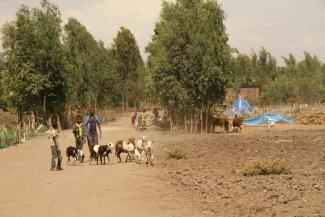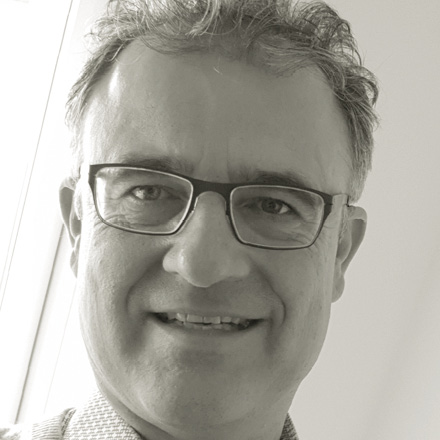Least developed countries
Addressing our climate reality
 kd
kd
2016 was the warmest year on record. This year, severe droughts have continued to plague my home country of Ethiopia and other countries in the region. Thousands of pastoralists have lost precious livestock and been displaced.
Across the sea in Bangladesh, freshwater is increasingly scarce as saltwater intrudes further inland, exacerbating the plight of the 2.5 million already suffering from drinking water shortages (see contribution of Feisal Rahman in D+C/E+Z (e-Paper 2017/4, p. 22, and D+C/E+Z print edition 20017/05-06, p. 30). Extreme weather events continue to batter communities, with Vanuatu hit earlier this year by the strongest May cyclone on record in the southern hemisphere.
This handful of stories represent a narrative becoming increasingly common across the world. They are an alarm bell, indicating the kind of events to come if we do not avert our current trajectory. The least developed countries (LDCs) are particularly vulnerable to these impacts, despite having contributed a negligible amount to the greenhouse-gas emissions now trapped in the earth’s atmosphere.
Global temperatures have already risen a staggering 1.1°C above preindustrial levels, according to a recent report by the World Meteorological Association. Projections indicate that on our current trajectory we would reach 2.6°C to 4.8°C of warming by the end of the century. From there the graphs only continue to climb.
These processes of warming are not even. In Africa, for example, warming occurs at 1.5 times the global mean according to the Intergovernmental Panel on Climate Change (IPCC). A two degree rise globally would bring temperatures to three degrees above preindustrial levels in Africa, dragging us further down the path of extreme drought and lost livelihoods.
As a meteorologist, I gained an appreciation of the devastating impacts such temperature increases would cause. The British climate scholar Kevin Anderson has stated that an increase of four degrees is “incompatible with an organised global community, is likely to be beyond ‘adaptation’, is devastating to the majority of ecosystems and has a high probability of not being stable”.
As a father, this is not the future I want for my children. As a human being, this is not the future I want for my country or the global community.
Yet this is currently the path we are on. Despite the international consensus achieved in Paris, commitments by countries to date do not provide a roadmap to a safe future. It is projected that full implementation of current pledges would still put the world on track for 3.5° degrees of warming by the end of the century. These pledges are insufficient to achieve the international community’s goal spelled out in the Paris agreement to “pursue efforts to limit the temperature increase to 1.5°C above preindustrial levels”.
Universal climate action
To secure a safe planet for present and future generations it is therefore vital that we move swiftly to translate the words of the agreement into the tangible actions that will protect our communities.
The LDCs are doing their part and have submitted ambitious plans under the Paris agreement, with many pledging to do more than their fair share of the global effort required to tackle climate change. As we are doing our part individually, we are also doing it collectively. The LDC Renewable Energy and Energy Efficiency Initiative for Sustainable Development, known as LDC REEEI, exemplifies this commitment to taking concrete climate action. The initiative is set to bring sustainable, clean energy to millions of energy-starved people in LDCs, facilitating improved energy access, the creation of jobs and contributing to the achievement of the Sustainable Development Goals. LDC REEEI is one of a number of initiatives that will foster access to energy across LDCs and other developing states under the auspices of the Global Partnership on Renewable Energy and Energy Efficiency.
Yet, the LDCs still represent merely a slim proportion of global emissions. The world can only be steered towards a safe future if every country acts consistently with their responsibility for causing climate change and their capacity to respond. The Paris agreement reflects this reality, recognising that an effective response to climate change is a holistic one that serves the interests of all the world’s people.
In addition to temperature and mitigation objectives, the international community agreed in Paris to a global goal of “enhancing adaptive capacity, strengthening resilience and reducing vulnerability to climate change, with a view to contributing to sustainable development.” A standalone article on loss and damage was also agreed, reflecting the harsh reality that even with swift action, the emissions already locked into the earth’s atmosphere will continue to bring impacts that communities in LDCs and across the world are unable to cope with or adapt to.
The Paris agreement also recognises that for an effective global response to climate change all countries need the tools to take action. LDCs and other developing countries often lack the capacity to develop the infrastructure that will enable them to reduce emissions and safeguard communities from climate impacts. The agreement, therefore, reaffirms obligations on developed countries to provide financial resources, technologies and capacity-building support to developing countries.
However, there is a wide and persistent gap between the resources needed and those provided. Preliminary estimates indicate that an excess of $ 4 trillion is required for developing countries to carry out the plans they have submitted under the Paris agreement. Currently $ 10.3 billion has been mobilised under the Green Climate Fund, and other resources such as the Least Developed Countries Fund are practically empty.
Advancing the Paris Agreement
The 23rd conference of parties (COP23) of the UN Framework Convention on Climate Change in Bonn in November provides opportunities to progress discussions on filling these gaps between current country commitments and the unchangeable reality of the work required to address climate change. These multilateral meetings provide a space for countries to share knowledge and work together on projects that implement the goals and commitments made under the Paris agreement and the Convention, such as LDC REEEI discussed above.
In the negotiating room, the LDC group will continue to demand a robust “rulebook” for implementing the Paris agreement. This will include a framework for transparency that promotes accountability among countries through public scrutiny of their emissions’ reductions and the support they provide to encourage greater action. At COP23, we need to see substantial progress made on this rulebook to move beyond procedural discussions to substantive outcomes.
Climate change is undoubtedly the greatest collective threat our world has faced, and defeating it requires a global response that is ambitious, fairly shared among countries and protects the world’s poor and vulnerable. Much work remains to be done globally to achieve this. Countries must reduce their greenhouse-gas emissions rapidly to prevent further warming. Adequate support must also be provided to LDCs and other developing countries to protect the world’s particularly vulnerable communities.
We must soberly evaluate the prospects of achieving the vital goals defined in Paris and adjust our actions accordingly if we are to safeguard our planet and our future. The fate of humanity hangs in the balance, and we must work together to ensure a prosperous future for all.
Gebru Jember Endalew chairs the Least Developed Countries Group in the UNFCCC process.
ldcchair.ethiopia@gmail.com

